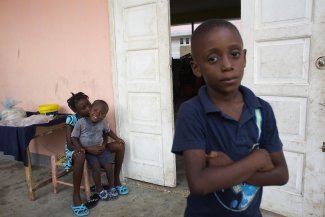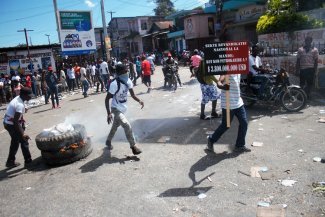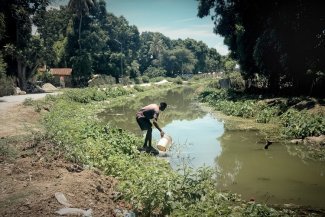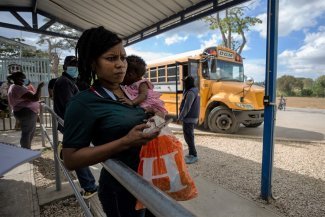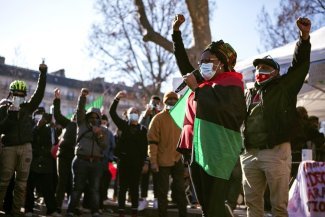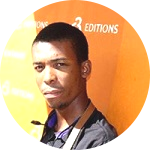
Students march through the Haitian capital of Port-au-Prince on 25 January 2021, in reaction to the kidnapping of a primary school student earlier that morning. The kidnappings are causing serious concern at every level of society. Most citizens are afraid to go out on the streets.
Insecurity is spreading across Haiti like gangrene, month after month. Murders and kidnappings for ransom by gangs operating with near impunity have multiplied. Former president Jovenel Moïse, accused of failing to act in the face of this crisis, and deeply distrusted by much of the civilian population, was himself a victim of the country’s widespread instability. He was assassinated on the night of 7 July 2021, by a mysterious commando team.
In May 2021, the government announced a truce in the violence, but it never happened. At no point did the kidnappings of Haitian citizens and foreigners cease, and they soon resumed in the chaos that followed the 14 August earthquake. Over one month after the earthquake and more than 650,000 people continue to need urgent humanitarian assistance, according to the United Nations.
In Thomassin, a mountainside neighbourhood south of the Port-au-Prince suburb of Pétion-Ville, a resident agreed to tell her story to Equal Times. Wearing a traditional white dress, this woman from a large Haitian family asked to remain anonymous. Struggling to hold back her tears, she recounts the atrocities experienced by one of her sons at the hands of his kidnappers. One evening in June, he was returning from a party at a friend’s house, when his vehicle hit a roadblock. “They pushed him to their car, where the kidnappers put a hood over his head,” says the mother of the 27-year-old, who left the country after his release. The kidnappers demanded US$1 million in ransom for his release. After negotiation, the family paid US$800,000.
The kidnappings are causing serious concern at every level of society. Most citizens are afraid to go out on the streets. Traders, professionals from all fields, schoolchildren and students seem to be targets for the kidnappers who demand huge sums from their relatives for their release.
With the ransoms demanded ranging from US$100,000 to US$1 million, the middle-class victims of these crimes find themselves suddenly plunged into poverty.
The phenomenon remained under the international news radar until 11 April, when seven Catholic clerics, two of whom were French, were kidnapped near Port-au-Prince. The operation has been identified as the work of men from the ‘400 Mawozo’ gang. Nearly 20 days later, the Society of Priests of Saint-Jacques, to which the priests belong, announced their release, without specifying whether a ransom had been paid.
The head of the 400 Mawozo gang is Joseph Wilson, alias Lanmò Sanjou (meaning ‘death without a day’ in English), an extremely violent man wanted for many months. Far from keeping his head down, he readily posts on social networks, giving numerous details about the atrocities, violence and crimes he claims to have committed with his men.
The failings of the state
In its latest report the Human Rights Analysis and Research Centre (le Centre d’Analyse et de Recherche en droits de l’homme, CARDH) reveals that over 150 murders and 200 kidnappings were recorded in Haiti in the month of June alone.
According to Pierre Espérance, executive director of the National Human Rights Defence Network (Réseau National de Défense des Droits de l’Homme, RNDDH) based in Port-au-Prince, the insecurity is the result of the complicity of the country’s rulers. “This kind of power trivialises life; it relies on gangs as its only force, believing the gangs can keep them in power.”
The gangs, which carry out the kidnappings, are interconnected, believes Marie Yolène Gilles, head of Fondasyon Je Klere (FJKL), a local human rights organisation. “Some gangs kidnap, either for someone else or based on their information. All sectors are left to their own devices.”
The Haitian National Police (PNH), contacted on this subject through the central office of the judicial police, say there is nothing they can do and that the families have to negotiate with the kidnappers themselves. Nevertheless, the PNH has been receiving help from the Colombian Police to strengthen its anti-kidnapping operations. Former Secretary of State for Public Security Réginald Delva believes that the police also have to review their methods of intervention. “The kidnappers act faster than the police, who are incapable of responding in 10 minutes.”
Refugees from violence
Faced with corruption and the lack of governance, gangs wage war against each other and against the police. They have veritable arsenals, ranging from handguns to automatic weapons. The first victims of this guerrilla warfare are the inhabitants of the poor neighbourhoods. In June, armed gangs clashed in the district of Martissant, in the south-west of the capital, forcing hundreds of residents to flee. Earlier this month, a Martissant gang leader announced a truce. The aim is to allow humanitarian aid to reach those ravaged by the last earthquake.
Martissant, where the public authorities are barely present, even though it is located just a few hundred metres from the presidential palace, is today largely controlled by armed groups. “I saw people in my neighbourhood fall under the bullets. The attackers set my house on fire. I had to run away with my kids. The armed men open fire on the rare private vehicles, such as those carrying passengers, who venture into the area,” explains a former resident of Martissant 7, not far from the local Martissant police station.
Because of this war in Martissant, more than 1,000 people have been housed in the gymnasium of the Carrefour Sports Centre since the beginning of June. They include 446 children and 582 women and girls who live in very precarious conditions. The majority of these families have seen their houses burnt down or damaged.
Crowded into the sports centre, these refugees benefit from the combined efforts of officials from Carrefour City Hall, UNICEF, the ADRA organisation and Haiti’s national water and sanitation agency DINEPA, who provide them with hot meals, clothing and hygiene kits. Another source of concern is the physical proximity in which these displaced people live. The risk of sexual delinquency is very high. Some mothers have told Equal Times they fear their teenage daughters may be abused. Physical distancing is no longer respected and the lack of masks and hand washing facilities add to their problems.
The commune’s temporary councillor did not hide his anguish. The situation is soon going to exceed the capacity of the municipal authorities, says Jude Édouard Pierre. Over a thousand mouths to feed at least twice a day is no small feat, he notes.
Pierre, visibly overwhelmed by the situation, is worried, particularly given the danger people face from Covid-19, while vaccines are slow to arrive in the country. “This could create further panic in society, and there is no hospital to take care of patients at Carrefour,” warns the councillor, before appealing for humanitarian aid.
“I would like to go home and go back to school,” says a 10-year-old girl, one of the refugees at the sports centre. “I lived in Martissant 19. Our family of five was forced to flee the area. It was here that other people told us that our house had been burnt down. I was even told that my school was damaged or burnt down, but I’m not sure.”
The insecurity also worries human rights defenders because of the threat it poses to democracy. After the Haitian photojournalist, Dieu-Nalio Chéry, who worked for the Associated Press and was forced to leave Haiti with his family, under threat of death, it was the turn of journalist Eloge Milfort of Radio Télé Métropole, editor at Vant Bèf Info (VBI) and member of the Haitian Association of Investigative Journalists (AHJI), forced to flee the country on 2 September 2021. The journalist received anonymous calls where individuals threatened to remove or even kill him.
Others did not have time to get away. Vision 2000 journalist and member of the AHJI, Diego Charles, was executed in front of his house on the night of 30 June together with political activist and human rights defender Marie Antoinette Duclair. They had received death threats before they were assassinated and now,according to Amnesty International, their relatives are also receiving death threats.
In the context of such a dire security and humanitarian situation, Haitian authorities this week asked the United States to suspend the deportation of migrants to Haiti, because the government says it is unable to help those who left the country in search of a better life and who are being forcibly returned.



